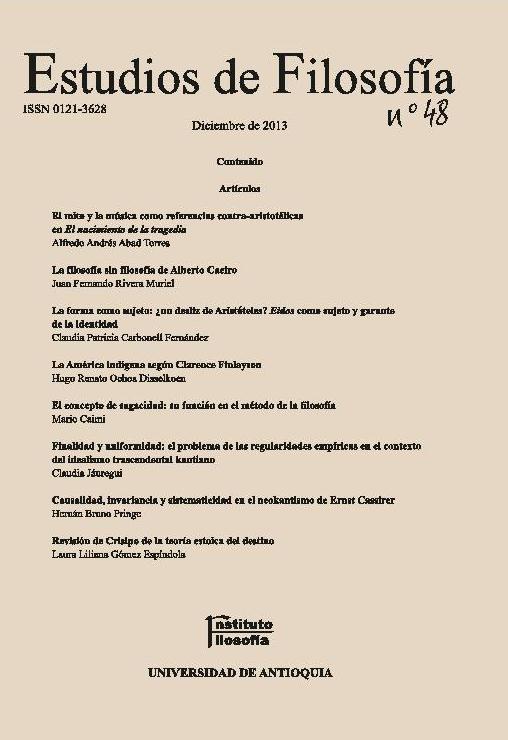The concept of shrewdness: its function in the philosophical method
DOI:
https://doi.org/10.17533/udea.ef.18350Keywords:
Kant, shrewdness, research method, Methodenlehre, reason, judgment.Abstract
In Anthropology, in the section that refers to higher cognitive faculties, shrewdness is presented as the gift of inquiry. This indicates that it has a place in scientific research. In our work we examine the role that can be attributed to shrewdness in the research method. The presence of shrewdness in a researcher is contingent, but it can be considered as a condition that determines the scope of the method and its limits. It also determines some features of the results of an investigation. Therefore, we suggest that shrewdness is an accessory condition of the method. The scientist’s personal intelligence is thus a critical element in the research, both in the posing of its purposes, and in the progress of work, and especially in the design stages of invention and discovery.
Downloads
References
BAUMGARTEN, A. G. (1779) Metaphysica. Editio VII, Halae Magdeburgicae.
BRANDT, R. (1998) Kritischer Kommentar zu Kants Anthropologie in pragmatischer Hinsicht (1798). Hamburgo, Meiner. DOI: https://doi.org/10.28937/978-3-7873-2796-6
CAIMI, M. (2001) Essay als Form der Philosophie. Eichstätt, Katholische Universität, 2001 (Eichstätter Universitätsreden 107).
CRUSIUS, Ch. A. (1965) Weg zur Gewissheit und Zuverlässigkeit der menschlichen Erkenntnis. Hildesheim, Georg Olms.
DE VLEESCHAUWER, H. J. (1967) Le sens de la méthode dans le discours de Descartes et la critique de Kant. En: H. Heimsoeth, D. Henrich und G. Tonelli (Hrsg). Studien zu Kants philosophischer Entwicklung. Hildesheim, Olms.
DI SANZA, S. (2010) Arte y naturaleza. El concepto de “Técnica de la naturaleza” en la Kritik der Urteilskraft de Kant. Buenos Aires.
KANT, I. (1968) Kants Werke. Akademie-Textausgabe. Berlin, Walter de Gruyter.
KANT, I. (1989) La metafísica de las costumbres. Trad. A. Cortina Orts y J. Conill Sancho, Madrid, Tecnos.
KANT, I. (2000) Lógica. Un manual de lecciones. Acompañada de una selección de reflexiones del legado de Kant. Trad. M. J. Vázquez Lobeiras, Madrid, Akal.
LA ROCCA, C. (2001) Vorläu ge Urteile und Urteilskraft. Zur heuristischen Logik des Erkenntnisprozesses. En: Akten des IX. Internationalen Kant- Kongresses, Berlin- New York, vol. II, pp. 351-361. DOI: https://doi.org/10.1515/9783110874129.721
LA ROCCA, C. (2003) Giudizi provvisori. Sulla logica euristica del processo conoscitivo. En: La Rocca, C. Soggetto e mondo. Studi su Kant. Venezia, Marsilio, pp. 79-119.
LA ROCCA, C. (2010) Psicologia della conoscenza. I giudizi provvisori come procedimento segreto dell’anima. En: Stefano Besoli, Claudio La Rocca, Riccardo Martinelli. L’universo kantiano. Filoso a, scienze, sapere. Macerata, pp. 418-421.
LA ROCCA, C. (2011) Vorläu ge Urteile und Urteilskraft. Zur heuristischen Logik des Erkenntnisprozesses. En: Akten des IX. Internationalen Kant- Kongresses, Berlin- New York, vol. II, pp. 351-361.
LEIBNIZ, G. W. (1875-1890) Philosophischen Schriften von Gottfried Wilhelm Leibniz. C. I. Gerhardt (Ed.), Berlin, Weidmann.
LOCKE, J. (1959) An Essay concerning Human Understanding. Alexander C. Fraser (Ed.), New York, Dover.
MELLIN, G. S. A. (1968) Encyclopädisches Wörterbuch der kritischen Philosophie. Jena y Leipzig, 1796- 1802. En: Aetas Kantiana. Culture et Civilisation, Bruselas.
PASCAL, B. (1963) Pensées sur la religion et sur quelques autres sujets. Paris, Lafuma.
TERUEL, P. J. (2008) Mente, cerebro y antropología en Kant. Madrid, Tecnos.
VÁZQUEZ LOBEIRAS, M. J. (2000) Estudio preliminar. En: Kant, I. Lógica. Un manual de lecciones Acompañada de una selección de re exiones del legado de Kant. Madrid, Akal.
WOLFF, Ch. (1740) Discursus praeliminaris de philosophia in genere. En: Philosophia rationalis sive logica, Methodo scientifica pertractata et ad usum scientiarum atque vitae aptata [etc.], Francofurti & Lipsiae.
Downloads
Published
How to Cite
Issue
Section
Categories
License
Copyright (c) 2013 Mario Caimi

This work is licensed under a Creative Commons Attribution-NonCommercial-ShareAlike 4.0 International License.
Authors who publish with this journal agree to the following terms:
1. The Author retains copyright in the Work, where the term "Work" shall include all digital objects that may result in subsequent electronic publication or distribution.
2. Upon acceptance of the Work, the author shall grant to the Publisher the right of first publication of the Work.
3. The Author shall grant to the Publisher a nonexclusive perpetual right and license to publish, archive, and make accessible the Work in whole or in part in all forms of media now or hereafter known under a Creative Commons Attribution-NoCommercia-ShareAlike (CC BY-NC-SA 4.0), or its equivalent, which, for the avoidance of doubt, allows others to copy, distribute, and transmit the Work under the following conditions: (a) Attribution: Other users must attribute the Work in the manner specified by the author as indicated on the journal Web site;(b) Noncommercial: Other users (including Publisher) may not use this Work for commercial purposes;
4. The Author is able to enter into separate, additional contractual arrangements for the nonexclusive distribution of the journal's published version of the Work (e.g., post it to an institutional repository or publish it in a book), as long as there is provided in the document an acknowledgement of its initial publication in this journal;
5. Authors are permitted, and Estudios de Filosofía promotes, to post online the preprint manuscript of the Work in institutional repositories or on their Websites prior to and during the submission process, as it can lead to productive exchanges, as well as earlier and greater citation of published work (see The Effect of Open Access). Any such posting made before acceptance and publication of the Work is expected be updated upon publication to include a reference to the Estudios de Filosofía's assigned URL to the Article and its final published version in Estudios de Filosofía.















